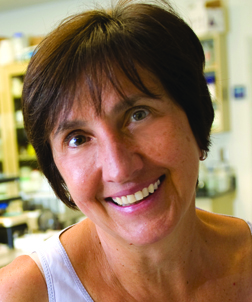Vaccine Could Delay Bowel Inflammation, Colon Cancer, Olivera Finn-led Research Finds
 Olivera Finn
Olivera FinnAn experimental vaccine against an abnormal protein found in some tumors has the potential to delay the onset of inflammatory bowel disease (IBD) and, in turn, prevent progression to colon cancer, according to researchers at the University of Pittsburgh School of Medicine. Their findings are reported in last week’s Cancer Prevention Research, a journal of the American Association for Cancer Research
People with chronic inflammatory disorders such as IBD are at greater risk for developing cancer at the inflamed site, said senior author Olivera Finn, professor and chair, Department of Immunology, Pitt School of Medicine. In other cases, genes that develop cancerous changes can trigger inflammation. The vaccine made by her team is directed against an abnormal variant of a self-made cell protein called MUC1, which is altered and produced in excess in both IBD and colon cancer.
“Our experiments indicate that boosting the immune response against this protein early in the disease can delay IBD development, control inflammation, and thereby reduce the risk of future cancers,” Finn said. “These findings suggest also that the early stages of chronic inflammation might be considered a premalignant condition.”
The researchers tested transgenic mice that spontaneously develop IBD and then progress to colitis-associated colon cancer, producing the human version of MUC1 in both disease states. They found that animals that received the vaccine showed the first signs of IBD significantly later than those in two control groups that did not get the vaccine.
Microscopic evaluation of the colon tissue showed less inflammation in the vaccinated mice and no indication of cancerous changes. Nearly half of the animals in each of the control groups had evidence of abnormal tissue, and two had colon cancer.
“The MUC1 vaccine seems to change the local environment from one that promotes cancer development to one that inhibits it,” Finn said. “Certain immune cells that we usually see in the inflamed colon aren’t present, and that could make the surroundings less friendly for potentially cancerous cells that also are directly targeted by the vaccine for destruction.”
This study suggests that in the future the vaccine might be considered as part of the therapeutic regimen for IBD as well. The experimental vaccine has been studied in patients with colon and pancreatic cancer and currently is being tested as a prevention measure in patients who have a high risk for developing colon cancer.
The study was funded by the National Cancer Institute and the Cancer Prevention Foundation.
Other Stories From This Issue
On the Freedom Road

Follow a group of Pitt students on the Returning to the Roots of Civil Rights bus tour, a nine-day, 2,300-mile journey crisscrossing five states.
Day 1: The Awakening
Day 2: Deep Impressions
Day 3: Music, Montgomery, and More
Day 4: Looking Back, Looking Forward
Day 5: Learning to Remember
Day 6: The Mountaintop
Day 7: Slavery and Beyond
Day 8: Lessons to Bring Home
Day 9: Final Lessons

